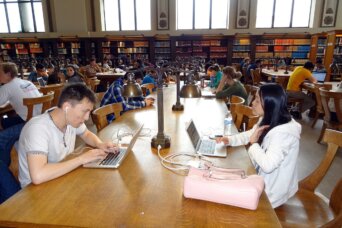- About
- Topics
- Story
- In-Depth
- Picks
- Opinion
- News
- Donate
- Signup for our newsletterOur Editors' Best Picks.Send
Read, Debate: Engage.
| topic: | Immigration |
|---|---|
| located: | USA |
| editor: | Yair Oded |
In its latest move to crack down on legal immigration, the U.S. government announced earlier this week that foreign students whose universities are transitioning to online-only instruction due to COVID-19 will lose their status and be forced to leave the United States before the beginning of the fall semester. The move has already been challenged in court but has nonetheless sewn panic among over one million foreign students who will be affected by the policy.
“The U.S. Department of State will not issue visas to students enrolled in schools and/or programs that are fully online for the fall semester nor will U.S. Customs and Border Protection permit these students to enter the United States,” Immigration and Customs Enforcement (ICE) announced on 6 July. “Active students currently in the United States enrolled in such programs must depart the country or take other measures, such as transferring to a school with in-person instruction to remain in lawful status.”
Students who fail to comply with the guidelines and either switch to an institution that offers in-person classes or leave the U.S. will be subjected to immigration penalties and face deportation, the agency stated.
In order to tackle the threat of coronavirus, many universities across the U.S. have been switching to online-only learning, with a relatively low number of them now offering in-person instruction. Since news of the policy broke out earlier this week, foreign students from across the country have been scrambling to find schools that offer in-person courses in order to maintain their status. Others have been looking to swap online for in-person classes with American students.
“There’s slim pickings for classes, and they all filled up so fast once the news came out that we’re pretty much left with no option,” said Rhea Joshi, an international student from India at the University of California, Los Angeles, in an interview for The New York Times.
"There's so much uncertainty. It's very frustrating. If I have to go back to Mexico, I am able to go back, but many international students just can't," Valeria Mendiola, a graduate student at Harvard's Kennedy School of Government, told CNN.
In an interview for CNN, Kenneth T. Cuccinelli II, the acting deputy secretary of the Department of Homeland Security, defended the policy, stating that “If they’re not going to be a student or they’re going to be 100 percent online, then they don’t have a basis to be here. They should go home, and then they can return when the school opens.”
But supporters of the new rule bluntly ignore the fact that international students constitute an integral part of both the educational institutions they attend and the communities they live in. Many of them had settled in their cities of residence, and forcing them to leave would mean tearing them apart from their families and lives. The regulations also pose a threat to students who come from countries with travel restrictions or for whom returning to their home countries might be dangerous.
Furthermore, as they generally pay full tuition and aren’t permitted to work, international students play a crucial role in sustaining U.S. universities and their local economies. A sudden forced removal of hundreds of thousands of them would be sure to have dire financial implications on educational institutions as well as on businesses and landlords operating in their vicinity.
The policy has been challenged in court by Harvard and the Massachusetts Institute of Technology (MIT), and it remains to be seen whether it will be enforced.
As the legal battle progresses, we witness once again how in order to promote its own interests (in this case courting anti-immigration voters and pressuring universities to open in-person classes by the fall), the Trump administration is willingly engaging in violation of human rights, degradation of the country’s institutions, and obliteration of local economies.
Image by Bishnu Sarangi

